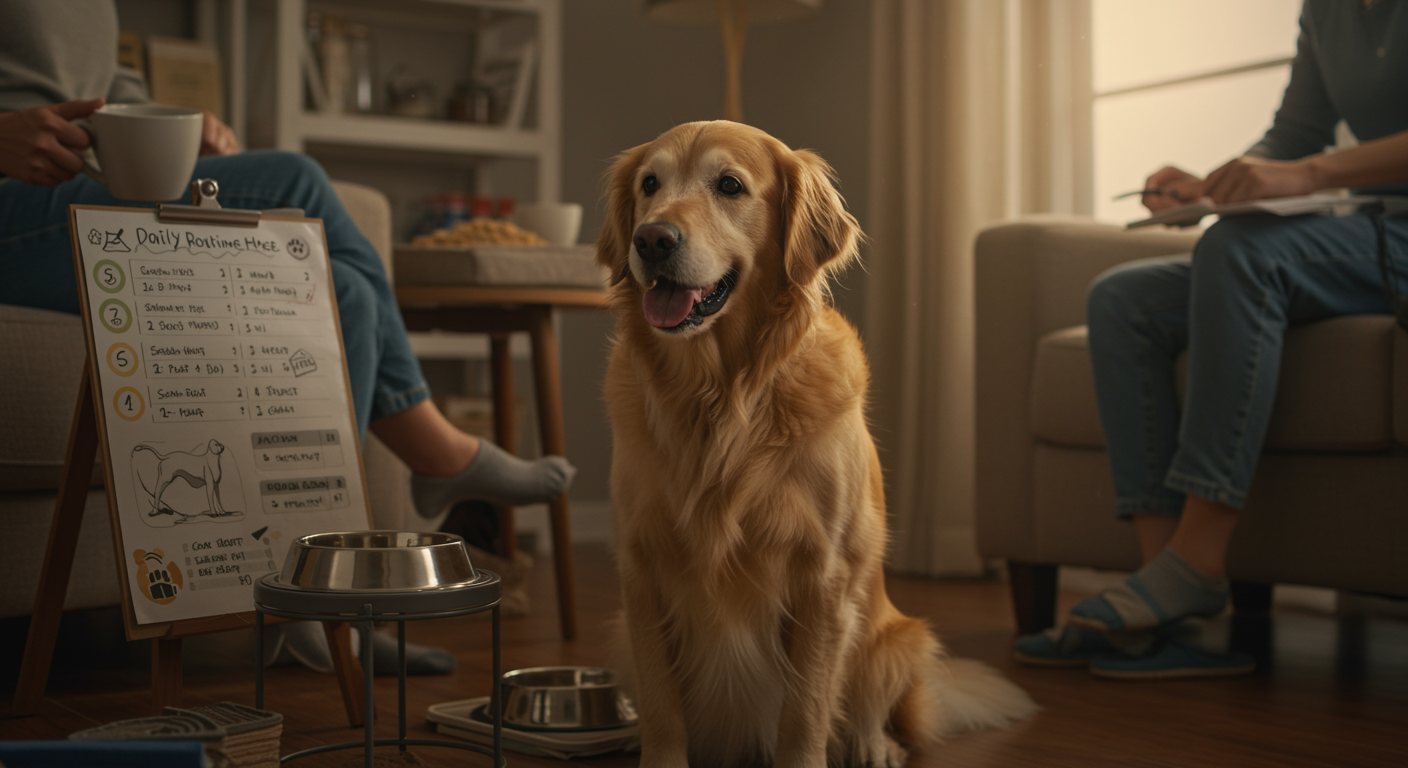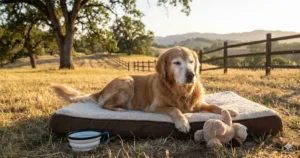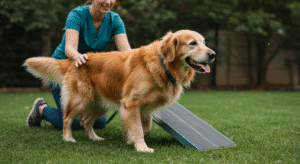Establishing and maintaining a healthy routine becomes increasingly important for senior Golden Retrievers as consistent schedules provide security, support physical health management, and help families monitor changes that may indicate developing health concerns. Well-designed routines accommodate the changing needs of aging dogs while maintaining structure that promotes both physical and emotional well-being.
Senior Golden Retrievers thrive on predictable routines that address their unique needs including medication schedules, modified exercise requirements, specialized nutrition timing, and regular health monitoring. These routines should be flexible enough to adapt to changing capabilities while providing the consistency that helps senior dogs feel secure and comfortable.
Creating effective healthy routines for senior dogs involves balancing structure with flexibility, incorporating necessary health management tasks into enjoyable daily activities, and establishing patterns that support both immediate comfort and long-term health maintenance throughout the aging process.
Understanding Senior Routine Needs
Importance of Structure for Aging Dogs
Security and Predictability Benefits
Consistent daily routines provide emotional security for senior Golden Retrievers who may experience anxiety about physical changes, cognitive shifts, or health challenges that affect their confidence and comfort levels.
Predictable schedules help senior dogs anticipate and prepare for daily activities, reducing stress and confusion while supporting their ability to navigate daily life with confidence and comfort.
Understanding that routine provides psychological comfort helps families prioritize consistency while recognizing that structure supports emotional well-being alongside physical health management.
Health Management Integration
Regular routines facilitate consistent medication administration, health monitoring, and care activities that become increasingly important for maintaining senior dog health and catching potential problems early.
Structured schedules help families maintain comprehensive care approaches while ensuring that important health management tasks don’t get overlooked in busy daily life.
Understanding how routine supports health management helps families appreciate the medical benefits of consistency while making care tasks feel natural rather than burdensome.
Individual Adaptation Requirements
Accommodating Physical Changes
Healthy routines for senior Golden Retrievers must accommodate changing physical capabilities including reduced mobility, altered energy patterns, and potential sensory changes that affect daily activities.
Understanding individual limitations and capabilities helps guide routine design that challenges appropriately while respecting physical constraints and comfort requirements.
Flexibility within structure allows for adaptation to daily variations in comfort, energy, or health status while maintaining overall routine benefits and security.
Cognitive Considerations
Senior dogs experiencing cognitive changes may benefit from simplified routines with clear cues and consistent patterns that support their ability to understand and participate in daily activities.
Understanding cognitive needs helps families design routines that provide mental stimulation while avoiding overwhelming complexity that could cause confusion or anxiety.
Routine consistency becomes particularly important for dogs with cognitive challenges as it provides structure that supports their ability to navigate daily life successfully.
Daily Schedule Framework
Morning Routine Establishment
Gentle Wake-Up Procedures
Starting the day with consistent, gentle wake-up routines helps senior Golden Retrievers transition from sleep to activity while allowing time for joints to warm up and stiffness to ease naturally.
Understanding that senior dogs may need more time to become fully alert and mobile helps guide morning routine timing that prevents rushing while maintaining structure.
Consistent morning greetings and gentle interaction help establish positive daily beginnings while providing opportunities to assess overnight comfort and daily readiness for activities.
Morning Health Assessment
Brief daily health checks integrated into morning routines help identify changes in mobility, appetite, or comfort levels that may require attention or routine modifications.
Understanding what to observe during morning assessments helps families gather valuable health information while making monitoring feel natural rather than clinical.
Documentation of morning observations provides valuable information for tracking patterns and communicating with veterinary professionals about changes or concerns.
Exercise and Activity Integration
Optimal Timing Strategies
Scheduling exercise during times when senior dogs typically feel most comfortable and energetic helps maximize activity benefits while respecting individual energy patterns and preferences.
Understanding individual daily rhythms helps guide activity timing that works with rather than against natural energy fluctuations and comfort levels.
Flexibility in exercise timing allows for adaptation to weather conditions, health fluctuations, or family schedules while maintaining consistent activity benefits.
Progressive Activity Building
Gradual activity building throughout the day helps maintain fitness and engagement while preventing overexertion that could cause discomfort or fatigue.
Understanding appropriate activity progression helps families balance stimulation with rest periods that support recovery and comfort throughout daily routines.
Varied activity types provide mental and physical stimulation while accommodating different energy levels and interests that may change with age or health status.
Comprehensive Daily Routine Guide
| Time Period | Activity Focus | Duration | Key Components | Adaptation Notes |
|---|---|---|---|---|
| Early Morning | Gentle wake-up, elimination | 15-20 minutes | Slow transition, outdoor access, comfort check | Allow extra time on stiff days |
| Morning | Breakfast, medication, light exercise | 45-60 minutes | Nutrition, health management, gentle movement | Adjust portions and activity as needed |
| Mid-Morning | Rest period, mental stimulation | 60-90 minutes | Comfortable positioning, cognitive activities | Quiet activities, flexible duration |
| Afternoon | Social interaction, moderate activity | 30-60 minutes | Family time, appropriate exercise | Match energy levels and weather |
| Evening | Dinner, relaxation activities | 45-60 minutes | Nutrition, winding down, comfort preparation | Consistent timing, calming atmosphere |
| Bedtime | Comfort preparation, settling routine | 20-30 minutes | Sleep area preparation, final elimination | Create peaceful transition to rest |
Nutrition and Feeding Routines
Meal Timing and Consistency
Optimal Feeding Schedules
Consistent meal timing helps regulate digestion while supporting medication schedules that may require coordination with food intake for optimal absorption and effectiveness.
Understanding individual digestive patterns helps guide meal timing that supports comfort and health while accommodating any dietary restrictions or special needs.
Regular feeding schedules help families monitor appetite changes and food intake patterns that provide important health information about senior dog well-being.
Portion Control and Monitoring
Measured portions help maintain appropriate weight while ensuring adequate nutrition, with adjustments based on activity levels, health status, and individual metabolism changes.
Understanding portion requirements helps prevent overfeeding that could contribute to obesity while ensuring adequate nutrition for maintaining health and energy.
Regular weight monitoring helps assess nutritional adequacy while identifying changes that may require dietary adjustments or veterinary consultation.
Hydration Support Integration
Water Access Optimization
Ensuring consistent access to fresh, clean water throughout daily routines supports proper hydration while making drinking convenient and appealing.
Understanding hydration needs helps guide water provision strategies that encourage adequate intake while monitoring for changes that might indicate health issues.
Creative hydration approaches such as flavored water or multiple water stations can encourage drinking while making hydration support feel natural within daily routines.
Exercise and Movement Routines
Structured Physical Activity
Daily Movement Requirements
Regular, gentle exercise helps maintain joint mobility, muscle strength, and cardiovascular health while providing mental stimulation and social interaction opportunities.
Understanding appropriate exercise types and intensities helps guide activity selection that provides benefits while respecting physical limitations and comfort requirements.
Consistent exercise schedules help maintain fitness while providing routine structure that senior dogs can anticipate and prepare for mentally and physically.
Activity Variety and Interest
Rotating different types of activities helps prevent boredom while accommodating varying energy levels and physical capabilities that may change daily.
Understanding individual activity preferences helps guide routine design that maintains engagement while respecting changing interests and capabilities.
Seasonal activity adaptations help maintain consistent exercise benefits while adjusting for weather conditions and environmental factors that affect comfort and safety.
Mental Stimulation Integration
Cognitive Exercise Inclusion
Daily mental stimulation helps maintain cognitive function while providing enrichment that supports psychological well-being and life satisfaction.
Understanding appropriate cognitive challenges helps guide activity selection that stimulates without overwhelming while accommodating any cognitive changes.
Creative mental stimulation approaches can be integrated throughout daily routines, making cognitive exercise feel natural rather than like additional tasks.
Health Management Routine Integration
Medication Administration
Schedule Coordination
Consistent medication timing helps maintain therapeutic levels while making administration feel routine rather than stressful for both dogs and families.
Understanding medication requirements helps guide daily schedule development that accommodates dosing needs while maintaining routine flow and convenience.
Creative administration techniques can make medication giving more pleasant while ensuring compliance and reducing stress for senior dogs who may be sensitive to handling.
Monitoring and Documentation
Regular health monitoring integrated into daily routines helps track medication effectiveness while identifying changes that may require dosage adjustments or veterinary consultation.
Understanding what to monitor helps families gather valuable health information while making tracking feel natural within daily care routines.
Simple documentation methods help maintain health records while providing valuable information for veterinary consultations and treatment planning.
Grooming and Hygiene Integration
Daily Care Tasks
Regular grooming activities help maintain hygiene and comfort while providing opportunities for health monitoring and bonding with senior dogs.
Understanding grooming needs helps guide routine development that maintains cleanliness while accommodating any sensitivity or mobility limitations.
Gentle grooming approaches help maintain coat and skin health while making care activities pleasant bonding experiences rather than stressful procedures.
Social Interaction and Bonding
Family Integration Routines
Quality Time Planning
Scheduled interaction periods help ensure that senior dogs receive adequate social stimulation while strengthening family bonds through consistent attention and engagement.
Understanding social needs helps guide interaction planning that provides meaningful connection while respecting energy levels and comfort preferences.
Flexible social activities can be adapted to daily energy levels while maintaining consistent opportunities for family bonding and emotional support.
Multi-Pet Household Considerations
Routine planning for multi-pet households helps ensure that senior dogs receive appropriate attention while managing interactions with other pets that support rather than stress aging companions.
Understanding social dynamics helps guide routine development that supports positive relationships while preventing conflicts or stress that could affect senior dog well-being.
Individual attention within group activities helps maintain special bonds while ensuring that senior dogs’ unique needs are met within family dynamics.
Rest and Sleep Routine Optimization
Sleep Schedule Support
Bedtime Routine Development
Consistent bedtime routines help senior dogs prepare for rest while creating positive associations with sleep that support quality rest throughout the night.
Understanding sleep needs helps guide bedtime routine development that promotes relaxation while addressing any anxiety or discomfort that might interfere with rest.
Comfortable sleep preparation helps ensure quality rest that supports overall health while providing security and comfort throughout night hours.
Rest Period Integration
Scheduled rest periods throughout the day help prevent overexertion while providing recovery time that supports energy management and comfort.
Understanding rest needs helps guide daily schedule development that balances activity with adequate recovery time for maintaining health and comfort.
Comfortable rest areas help support quality rest while making rest periods pleasant rather than feeling like restrictions on activity.
Seasonal and Weather Adaptations
Routine Flexibility Planning
Weather-Based Modifications
Seasonal routine adaptations help maintain consistency while adjusting for weather conditions that affect comfort, safety, and activity appropriateness.
Understanding weather impacts helps guide routine modifications that maintain health benefits while prioritizing safety and comfort during challenging conditions.
Indoor activity alternatives help maintain routine consistency when weather conditions prevent outdoor activities or make them uncomfortable for senior dogs.
Holiday and Special Event Adaptations
Flexible routine approaches help maintain stability during holidays or special events while allowing for celebration participation that doesn’t overwhelm senior dogs.
Understanding stress management helps guide routine modifications that accommodate special occasions while protecting senior dogs from overwhelming stimulation or disrupted schedules.
Gradual routine changes help senior dogs adapt to temporary schedule modifications while maintaining overall routine benefits and security.
Long-Term Routine Sustainability
Caregiver Considerations
Family Involvement Strategies
Involving family members in routine maintenance helps ensure consistency while preventing caregiver burnout that could compromise routine quality and effectiveness.
Understanding family capabilities helps guide routine development that is sustainable long-term while meeting senior dog needs comprehensively.
Training family members in routine tasks helps ensure consistency while building confidence in providing appropriate care and support.
Adaptation Planning
Planning for routine evolution helps families prepare for changing senior dog needs while maintaining routine benefits throughout the aging process.
Understanding that routines may need modification helps families stay flexible while preserving the security and health benefits that consistency provides.
Regular routine assessment helps identify successful elements while recognizing when changes may be needed to maintain effectiveness and appropriateness.
Quality of Life Enhancement
Routine Enjoyment Factors
Positive Association Building
Creating enjoyable routine elements helps senior dogs look forward to daily activities while making necessary care tasks feel pleasant rather than burdensome.
Understanding individual preferences helps guide routine development that incorporates enjoyable activities while meeting health and care requirements.
Celebrating routine successes helps maintain motivation for consistency while building positive associations with daily care and health management activities.
Flexibility and Adaptation
Balancing structure with flexibility helps maintain routine benefits while adapting to daily variations in energy, comfort, or health status that may require modifications.
Understanding when to maintain routine versus when to adapt helps families provide appropriate care while respecting individual needs and limitations.
Quality of life focus helps ensure that routines enhance rather than restrict daily experiences while supporting health and comfort throughout the aging process.
Creating healthy routines for senior Golden Retrievers provides essential structure that supports both physical health and emotional well-being while accommodating the unique needs and challenges of aging. Through thoughtful planning, consistent implementation, and ongoing adaptation, families can establish routines that enhance quality of life while simplifying care management.
Success in routine development comes from understanding individual needs, maintaining flexibility within structure, and focusing on activities that support both immediate comfort and long-term health. With proper attention and adjustment, healthy routines can significantly contribute to senior dog happiness and well-being throughout their golden years.
The investment in comprehensive routine development demonstrates commitment to senior dog welfare while creating sustainable approaches to care that can be maintained throughout the aging process, ensuring that beloved companions receive consistent support and attention.




Comments
Pingback: Maintaining a Healthy Routine for Senior Golden Retrievers